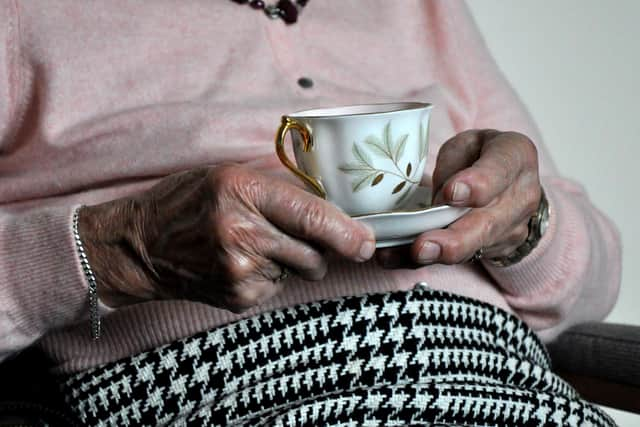How to stop online scammers preying on people with dementia – Angela Rippon


Government advice says that men and women in the UK with chronic neurological conditions are at increased risk of severe illness from coronavirus and are asked to stay at home for an extensive period.
For the 850,000 people living with dementia, their loved ones and their carers the situation is causing stress and anxiety.


Advertisement
Hide AdAdvertisement
Hide AdTo add to the stress, fraudsters are exploiting the spread of the Covid-19 coronavirus to help commit various types of fraud and cyber crime.
For some people, Covid-19 may increase their susceptibility to the risk of financial abuse due to being home alone, answering telephones, being on the internet more than usual and potentially trusting others with their cash to buy supplies.
We are calling on people affected by dementia in the UK – whether you’re living with dementia, supporting or caring for someone living with the condition – to follow and share Alzheimer’s Society’s top tips on avoiding scams.
This could have a huge impact in helping protect people affected by dementia from falling victim of scams during this period.
Advertisement
Hide AdAdvertisement
Hide AdCurrent corona-themed scams include fraudulent sellers claiming to sell protective face masks that haven’t arrived; paying for tests which do not exist; emails that appear to be from a legitimate company or government department attempting to trick you into clicking on a malicious link and providing sensitive information, and door-knockers using coronavirus as a guise to gain entry to homes and steal money.
Some older people living with dementia may not be familiar with handling emails and surfing the internet, meaning they can be easy targets for scammers.
To avoid scams online:
Check you’re buying from a real company. You can search for a company’s details on GOV.UK. This will tell you if they’re a registered company or not.
Check to see what people have said about the company. It’s worth looking for reviews on different websites such as Which? – don’t rely on reviews the company has put on its own website.
Advertisement
Hide AdAdvertisement
Hide AdIf you decide to go ahead with the purchase, use a credit card if you have one, as most major credit card providers insure online purchases.
If you get an email from a company with a strange email address or one that has never emailed you before asking you for money/payment unexpectedly, don’t click on links to download anything. Doing this could infect your computer with a virus. Make sure your antivirus software is up to date to give you more protection.
There is also plenty of Covid-19 information available online from reputable sources, including Alzheimer’s Society, GOV.UK and the WHO.
With people affected by dementia now being isolated in their own homes, they may be more likely to answer their door bell and interact with door to door scammers.
To avoid falling victim of a face-to-face scam:
Advertisement
Hide AdAdvertisement
Hide AdDon’t feel pressured to accept help from a stranger. Never hand over money, bank details or bank cards to someone you don’t know who is offering to help you. Offers of help for most things should be free of charge, for example dog walking or fetching medication.
If someone offers to do your shopping, ask for a receipt so that you can pay them on their return to cover the cost of the items.
If someone claims to be from a recognised organisation, then don’t be afraid to ask to see proof (e.g. ID card) or check with the organisation itself.
If possible, call a friend or family member to discuss the help you’ve been offered.
Advertisement
Hide AdAdvertisement
Hide AdDuring the coronavirus pandemic, Alzheimer’s Society is providing advice and practical tips for people living with dementia and those supporting them – either in the same household or from a distance.
Anyone affected by dementia can call their support line on 0333 150 3456.
Editor’s note: first and foremost - and rarely have I written down these words with more sincerity - I hope this finds you well.
Almost certainly you are here because you value the quality and the integrity of the journalism produced by The Yorkshire Post’s journalists - almost all of which live alongside you in Yorkshire, spending the wages they earn with Yorkshire businesses - who last year took this title to the industry watchdog’s Most Trusted Newspaper in Britain accolade.
Advertisement
Hide AdAdvertisement
Hide AdAnd that is why I must make an urgent request of you: as advertising revenue declines, your support becomes evermore crucial to the maintenance of the journalistic standards expected of The Yorkshire Post. If you can, safely, please buy a paper or take up a subscription. We want to continue to make you proud of Yorkshire’s National Newspaper but we are going to need your help.
Postal subscription copies can be ordered by calling 0330 4030066 or by emailing [email protected]. Vouchers, to be exchanged at retail sales outlets - our newsagents need you, too - can be subscribed to by contacting subscriptions on 0330 1235950 or by visiting www.localsubsplus.co.uk where you should select The Yorkshire Post from the list of titles available.
If you want to help right now, download our tablet app from the App / Play Stores. Every contribution you make helps to provide this county with the best regional journalism in the country.
Sincerely. Thank you.
James Mitchinson
Editor
